Dark side of China’s frenetic growth
A string of blistering reports, high-level arrests and promises to tighten the law have shed new light on the murky world of government corruption in China.

They also suggest that the ruling Communist Party is trying to take a more aggressive line when it comes to dealing with official misdemeanours.
Despite the harsher prison sentences and the widening scope of investigations, however, some observers are not convinced these measures alone will help.
“Corruption by low-level officials has seriously destroyed the reputation of the government,” Wang Xixin, a governmental legal adviser, said.
Pu Zhiqiang, a lawyer experienced in defending journalists in defamation cases brought by officials accused of bribery, says that, for all the appearance of change, nothing much is happening.
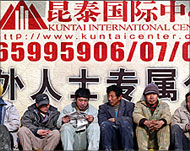 |
|
The number of visitors to Bejing |
A 2003 survey by a Hong Kong risk consultancy group calculated that the scale of graft in China was equivalent to 3-5% of total GDP, and in an index compiled by the Financial Times, China’s corruption rating rose last year from 7 to 8.33 (10 being the worst). In comparison, Indonesia was 9.33 and India 9.3.
Confiscations
With his snow-white hair, wizened face and squinting eyes, Niu Yuchang looks the part for a man who has spent too long toiling under the midday sun.
Looking slightly out of place in a Beijing cafe, he sips herbal tea before continuing, accompanied by agitated arm movements, his explanation of why he has come to seek advice from the man seated next to him.
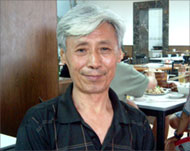 |
|
Niu Yuchang represents some of |
Representing three separate groups of farmers, Niu describes how rural government officials have confiscated the farmer’s land without proper compensation.
Subsequently sold for RMB7-8 million ($850,000-960,000) to property developers, the farmers were left without a means of existence in a country with only a semblance of a social security system.
Nodding in understanding, Niu’s confidant, former Communist Party Youth League official Zhang Zuhua, has clearly seen this all before.
Talking to Aljazeera.net, Zhang said that over 40 million farmers have suffered some form of unjustified land confiscation similar to the ones described by Niu, as rapacious officials abuse their positions of power to make a quick buck.
The problem he says is only one part of a much wider plague of corruption that blights the country and causes deep-seated resentment.
Candid reports
Emanating from the National Audit Office (NAO), an ongoing series of unusually candid reports continues to highlight missing monies and misappropriated funds of a phenomenal size.
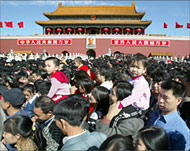 |
|
Corruption has become worse in |
In investigations carried out last year into 130,000 state-owned enterprises, the NAO discovered that $7.7 billion worth of government funds had been misused.
Further announcements from the NAO in June stated that some $580million set aside for poverty-alleviation schemes had vanished and, in a second report, the General Administration of Sport was accused of misappropriating nearly $16million since 1999 – money that had been destined for use by the Chinese Olympic Committee.
Commenting on this second report, Huang Yaobo of the Beijing Olympic Research Association was quoted as saying that “as the amount of people and money involved in the games is so huge, corruption is almost unavoidable”, symptomatic of the benign acceptance within society that corruption exists.
In addition, 2003 saw the arrest of 12 provincial and ministry-level officials – high-level government members not usually subject to investigation – plus the news that 19,374 civil servants had lost their jobs since 1996 as part of a campaign to clean up the government.
However, Zhang, the ex-Communist Party youth leader, says despite the high-profile investigations and occasional execution, corruption remains as potent a problem as ever.
Getting worse
“It has been 15 years since Tiananmen Square but the problem of corruption is much worse than before,” Zhang said, referring to the 1989 protests and subsequent massacre that began in response to perceived graft among officials.
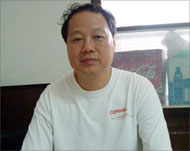 |
|
Ex-youth leader Zhang says it is |
“Corruption in China is big in scale and a systemic problem – the number of people involved is huge and the individual amounts of money some people are now pocketing regularly exceed RMB10 million ($1.2 million).”
Cases range in scale from “special fees” to secure bank loans or business permits to the case of Lai Changxing – a man who reportedly smuggled $6 billion worth of goods, including cars and oil, into China during the 1990s and is now currently hiding out in Canada trying to avoid extradition.
And in a touch of black humour, a recent survey among schoolchildren in Shanxi province revealed that a large number of budding youngsters wanted to become officials, “so we can take bribes!”
Ultimate power
According to Pu, the lawyer who defends journalists, “The government of Premier Wen Jiabao and President Hu Jintao want to effect change but they will not succeed. That’s because of the system under which they operate.”
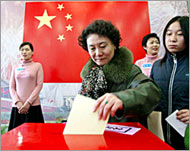 |
|
Can any drive against corruption |
“At heart, the government has the following characteristics: a monopoly on power, control over the media and a legal system that is not independent.”
“They have ultimate power and because of this control any anti-corruption struggle can only be an inhouse affair. People therefore believe that any anti-corruption struggle will not be satisfactorily solved,” he says.
Writer Chen Guidi, who earlier this year published a book complete on rural corruption, concurs. In his book he referred to a number of murders, including the killing of four farmers by one official in five minutes after they complained about his abusive business practices.
“If you go after an official, you need to make sure you can bring them down, otherwise they will get you,” Chen said, speaking to Aljazeera.net.
|
“If you go after an official, you need to make sure you can bring them down, otherwise they will get you” Chen Guidi, author of book on rural corruption in China |
The simple result is that few media editors will risk publication of a corruption-related story without higher approval – something that occasionally happens when the government wishes to name and shame errant officials.
The onus is therefore very much on the government to put its own house in order. But according to Zhang, the government’s brand of self-censorship has its limits.
Anti-corruption investigators are themselves appointed and promoted by the Communist Party committees that exist at each level of government – the same party members that they are supposed to include in their investigations, just one example Zhang says of the multitude number of conflicting interests that exist.
Absence of trust
“In the hierarchical nature of Chinese politics, it is very difficult to prosecute for corruption,” Zhang says.
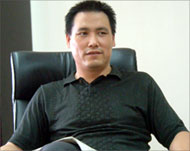 |
|
Pu, a lawyer, says the present |
In addition, the rewards are now too great for officials to be perturbed by the occasional arrest, as the government has long operated under the mantra of “killing the rooster to frighten the monkey” (making an example of one person in the hope of encouraging others to fall in line) rather than any systematic approach to tackle corruption wherever it is found.
Nor are the tangible results being yielded entirely successful. According to the official Xinhua news agency, the number of aggrieved subjects travelling to Beijing each year to register a complaint has “maintained a rising momentum”, last year surpassing one million.
“To rule you need the trust of the people,” says Pu Zhiqiang, “but at the moment the government does not have our trust.”
Political reform, say both Zhang and Pu, is what is needed if rampant corruption is to be relegated to the dustbin of history – a term that central government officials are keen to avoid yet cannot ignore.
Memories of Tiananmen and a basic knowledge of Chinese history – out-of-control corruption and mismanagement were often key reasons behind why imperial dynasties fell – mean that this is one battle the Communist Party cannot afford to lose.